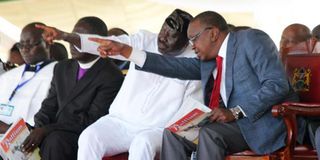Kenyans should hold leaders to account over divisive tribalism

President Kenyatta and Nasa leader Raila Odinga. They are locked in a silent but fierce election battle. PHOTO | FILE |
What you need to know:
- We do not expect the President to be telling us he will win elections in the middle of a national crisis about which his government appears miserably helpless.
- If we did, the people of central Kenya would not be so receptive to negative sentiments by the President against Raila Odinga, who does not collect our taxes and is hence not responsible for development activities or lack of them.
- If we interrogated the performance of our leaders and the government, elected leaders from central Kenya would not acquiesce to the government’s failure to address the challenges facing their people in the name of tribal solidarity.
In early 2003 when he served as leader of the opposition, Uhuru Kenyatta challenged then President Mwai Kibaki to quit leadership if he could not resolve the nationwide strike by lecturers in public universities.
He would later dismiss Kibaki’s signature laid back governance as a government of “hear nothing, say nothing and do nothing”. One would have expected that, given a chance, Uhuru Kenyatta would be more issue-oriented and committed to addressing the plight of the people.
Yet at the peak of a doctors’ strike that has paralysed health services in public hospitals, the President continues to hold evasive public rallies and avoids addressing the critical questions of the day, notwithstanding the suffering of ordinary Kenyans. His pet theme, carried over from his central Kenya visit, was Cord leader Raila Odinga, whom he tried to depict as Kenya’s biggest problem for discrediting his government over corruption.
Last week in Machakos, he extended the tired narrative of opposition bashing and went ahead to declare that the ruling coalition would triumph over the opposition in the 2017 elections.
This is quite frustrating to the ordinary citizens who look up to the President’s office for leadership and confidence. We do not expect the President to be telling us he will win elections in the middle of a national crisis about which his government appears miserably helpless. Unless he is seeking leadership for its own sake.
And yet this is not an isolated case. From boasting about meat-eating while others are salivating to mocking the International Criminal Court over protests in the US, the President has perfected the art of insensitive jokes that flout public perception of good taste and leadership.
Why does the President do this? Most likely it is because he knows he can get away with it because of Kenyans’ pious civility and ethnicity that hold us back from interrogating our leaders or questioning their performance while in office.
If we did, we would ask the President why he is campaigning for a second term when he has publicly declared his helplessness in fighting corruption, yet he has personally acknowledged that it is a serious problem that undermines even national security.
If we did, the people of central Kenya would not be so receptive to negative sentiments by the President against Raila Odinga, who does not collect our taxes and is hence not responsible for development activities or lack of them.
If we interrogated the performance of our leaders and the government, elected leaders from central Kenya would not acquiesce to the government’s failure to address the challenges facing their people in the name of tribal solidarity.
Every time these leaders talk on local radio stations, they preach against the opposition and try to persuade their people to register as voters to protect “their” government. None of them laments the wanton insecurity plaguing their people, which has even brought the small-scale economy to near-collapse due to extortionist cartels, carjackings, and general gangsterism.
It is high time Kenyans shed this backward politics and demanded value for money from their national and county governments. The government should not get away with the negative politics that has brought this country to near-stagnation.
For the more-than three-years that Uhuru Kenyatta has been president, he ought to have stamped his leadership with tangible solutions to national problems across the country, and he ought to be marketing his leadership across the board on the basis of concrete achievements without the tired and divisive criticism of the opposition.
The ordinary citizens need to appreciate that they are the losers in this game of negative tribalism that has kept our country backward and unable to get good leaders because of our obsession with tribe.
When shall we have a leader from Nyeri holding a public rally in Kisumu and local people listening to him? When shall we have a presidential candidate from Kakamega holding a public rally in Kiambu and people attending because of his ideas?
The farther we are from this, the more backward we are and the farther we remain from becoming a modern nation.
Mr Njaga is a travel consultant. [email protected]




